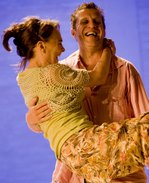SITE GUIDE
SEARCH
REVIEWS
REVIEW ARCHIVES
ADVERTISING AT CURTAINUP
FEATURES
NEWS
Etcetera and
Short Term Listings
LISTINGS
Broadway
Off-Broadway
NYC Restaurants
BOOKS and CDs
OTHER PLACES
Berkshires
London
California
New Jersey
DC
Philadelphia
Elsewhere
QUOTES
TKTS
PLAYWRIGHTS' ALBUMS
LETTERS TO EDITOR
FILM
LINKS
MISCELLANEOUS
Free Updates
Masthead
Writing for Us
A CurtainUp  London Review
London Review
 London Review
London ReviewUnder The Blue Sky
|
I'm good at crowd control but I do want to teach again.— Nick
|

Francesca Annis as Anne and Nigel Lindsay as Robert
(Photo: Johan Perrson) |
Much is made in the theatre programme about these people working away at the chalkface and of the fact that they are in a profession which relies more on a sense of vocation and dedication than monetary reward. However their profession appears to be of small relevance to the storylines, other than the fact that they meet in the workplace, a school staff room or in the case of the last couple, on a joint holiday arranged for several schools from different parts of the country. The stories loosely link with mention of characters from the first in the second and third plays but other than that, I was unable to identify a theme running through the plays.
In the first scene set in London near Canary Wharf, Nick (Chris O'Dowd) tells Helen (Lisa Dillon) that he is jumping ship from the state sector to go and work in a private school. They have been friends with one brief sexual night together and it is apparent that Helen has hopes that they might be more than friends in future. In fact, she thinks mistakenly that this might be the big news that Nick has asked her round to his flat to hear. The comedy is based on her fantasy of their future and his desire to escape. "Maybe it won't be such a bad thing not seeing so much of each other?" he suggests which makes her remember how she was attacked by a pupil with a knife and yet she has stuck with teaching at the same school in the same area.
In the second scene, set fifteen months after the first, two teachers from Nick's new school arrive in a bedroom for a night of drunken passion. Michelle (Catherine Tate) has just been dumped by Nick (from the first scene) and has gone home with Graham (Dominic Rowan) the staffroom innocent. Loud mouthed and sexually explicit, alcohol loosing her tongue, Michelle is caustic, angry and belittling while Graham quivers with sexual inexperience and ineptitude.
The final play sees a mature woman teacher Anne (Francesca Annis) link up with a younger man Robert (Nigel Lindsay). They refer back to Michelle from the middle play, slapper they call her, and tell us what has become of Helen from the first play. Anne's story is about her Aunt May and Arthur, a man that she knew who went to fight in France in the First World War. May joined up as a nurse and found Arthur badly wounded. This story of love and loss allows Anne and Robert to focus on happiness rather than convention which might dictate their being closer in age. They both have observations to make about teaching. Robert says, "Wherever you teach, you're doing the most important job there is!"
The performances are faultless. Chris O'Dowd's likeable but flaky boyfriend; Lisa Dillon's intense and desperate Helen. Catherine Tate's feisty and vulgar tart; Dominic Rowan's embarrassed virgin. Francesca Annis' beautiful and tender older woman; Nigel Lindsay's witty and interesting teacher who confesses to, "Going out with our sixth formers because they're more interesting than our fuckshit boring colleagues!" On a design note, the scenes from 1996, 1997 and 1998 have out of place fashions from 2007-8. The 1996 era is important because it opens with an IRA bomb at Canary Wharf.
I feel that the teaching theme seems just glanced on rather than having significance and the three relationships do not really complement each other into a cohesive whole. In relationship terms, the age of innocence is succeeded by one of competition and promiscuity and in maturity, at last a couple can express their real selves when inspired by history. I really liked David Eldridge's 2005 adaptation of Festen but I wished for some clouds and perhaps thunder and lightning in the tolerable but insipid Blue Sky.
|
Under The Blue Sky
Written by David Eldridge Directed by Anna Mackmin Starring: Catherine Tate, Francesca Annis With: Chris O'Dowd, Lisa Dillon, Dominic Rowan, Nigel Lindsay Design: Lez Brotherston Lighting: Mark Henderson Sound: Paul Arditti Choreographer: Scarlett Mackmin Running time: One hour 30 minutes without an interval Box Office: 0870 060 6623 Booking to 20th September 2008 Reviewed by Lizzie Loveridge based on 28th July 2008 performance at the Duke of York's, St Martin's Lane, London WC2 (Tube: Leicester Square) |
|
REVIEW FEEDBACK Highlight one of the responses below and click "copy" or"CTRL+C"
Paste the highlighted text into the subject line (CTRL+ V): Feel free to add detailed comments in the body of the email and state if you'd like your comments published in our letters section. |
|
London Theatre Tickets Lion King Tickets Billy Elliot Tickets Mighty Boosh Tickets Mamma Mia Tickets We Will Rock You Tickets Theatre Tickets |




